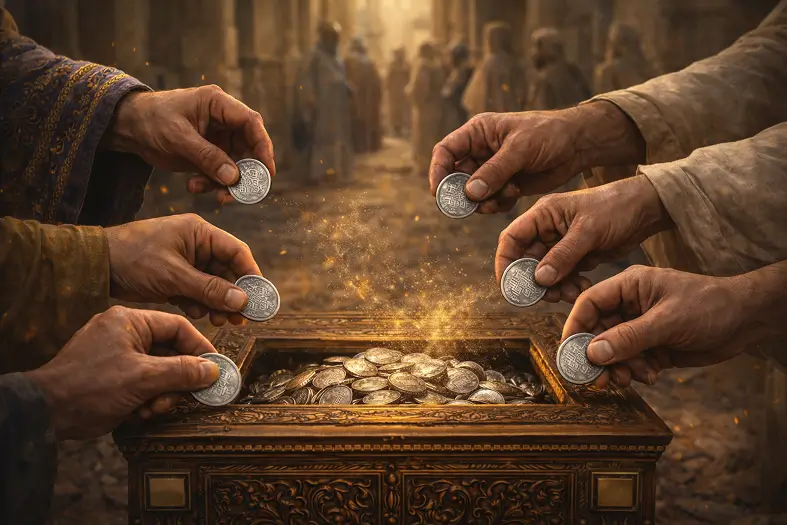


Every adult Jewish male must contribute a fixed half-shekel each year for the communal offerings of the Beis HaMikdash, ensuring that all Israel participates equally in the national service of Hashem.
The mitzvah of the machatzis ha-shekel establishes the obligation for every Jewish male to give a uniform half-shekel annually for the korbanos tzibbur and other needs of the Beis HaMikdash (Shemos 30:11–16). Unlike other forms of tzedakah, this contribution was fixed and equal for all, expressing the principle that every Jew shares equally in the communal avodah of Klal Yisrael.
Rambam explains that the funds collected from the half-shekel were used to purchase the daily korbanos and other public offerings, ensuring that these sacrifices represented the entire nation (Hilchos Shekalim 1:1–3). The Torah explicitly commands that “the rich shall not give more and the poor shall not give less,” emphasizing that before Hashem every Jew possesses equal spiritual worth.
Chazal interpret the half-shekel as symbolizing that no Jew is spiritually complete alone; only as part of the collective people does each individual become whole (Yerushalmi Shekalim 2:3). The annual contribution therefore served not only as financial support for the Mikdash but as a ritual expression of unity and shared responsibility.
Ramban explains that the half-shekel also functioned as a form of kapparah, since the korbanos purchased through these funds atoned for the nation collectively (Ramban to Shemos 30:12). By participating equally, every Jew entered into the communal covenant of avodah and forgiveness.
Sefer HaChinuch emphasizes that the mitzvah cultivates identification with Klal Yisrael. When a Jew contributes to the communal service, he recognizes that he is part of a greater spiritual organism devoted to Hashem’s service (Chinuch Mitzvah 105).
Rambam
Sefer HaChinuch
Rashi
Ramban
Talmud & Midrash
Acharonim & Modern Torah Giants
Chassidic & Mussar Classics
Contrast with Mitzvah 250 — To Give Charity
Parallel to Mitzvah 301 — To Build the Sanctuary
Supporting the Institutions of Torah
Strengthening Jewish Unity
Remembering the Communal Avodah
Seeing Oneself as Part of Klal Yisrael


Mitzvot that strengthen communal life — showing up, participating, supporting, and belonging. Community is where holiness is shared, prayers are multiplied, and responsibility becomes collective.
Tied to the eternal covenant between G‑d and the Jewish people, including signs like brit milah and Shabbat.
Represents Emunah—the deep, inner trust in Hashem’s presence, oneness, and constant involvement in our lives. This badge symbolizes a heartfelt connection to G-d, rooted in belief even when we cannot see. It is the emotional and spiritual core of many mitzvot.
Concerns the Beit HaMikdash, korbanot (offerings), and priestly service.
Represents the concept of spiritual intentionality, purity, and sanctity—set apart for a higher purpose.
Mitzvot that uphold fairness, honesty, and moral responsibility. Justice is kindness structured — ensuring that society reflects G-d’s order through truth, equity, and accountability.
Mitzvot that govern ethical behavior, kindness, justice, and responsibility in human relationships. These actions build trust, dignity, and peace between people.
Mitzvot that define and deepen the relationship between a person and their Creator. These include commandments involving belief, prayer, Shabbat, festivals, sacrifices, and personal holiness — expressions of devotion rooted in divine connection.

Dive into mitzvos, prayer, and Torah study—each section curated to help you learn, reflect, and live with intention. New insights are added regularly, creating an evolving space for spiritual growth.

Explore the 613 mitzvos and uncover the meaning behind each one. Discover practical ways to integrate them into your daily life with insights, sources, and guided reflection.

Learn the structure, depth, and spiritual intent behind Jewish prayer. Dive into morning blessings, Shema, Amidah, and more—with tools to enrich your daily connection.

Each week’s parsha offers timeless wisdom and modern relevance. Explore summaries, key themes, and mitzvah connections to deepen your understanding of the Torah cycle.